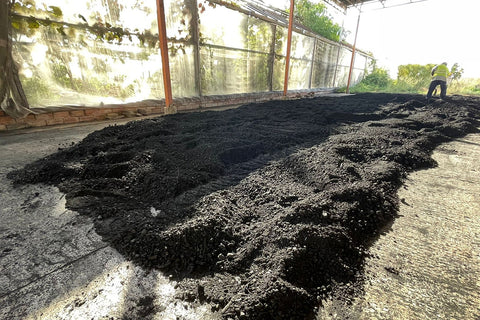Biochar Origins
The soil from Circle Carbon Labs has its origins in the Amazon Jungle, where “Terra Preta”, or “Black Soil” was first discovered some 100 years ago. It was found that these soils were extremely fertile, something that cannot occur naturally in the Amazon due to the heavy rainfall that washes naturally occurring top soil away.
Today there is little doubt that within settlement areas where the proportion of biochar exceeded that found in other soils, the biochar was produced as a side effect of village fire management practices, and perhaps even deliberately produced and added to soil.
In other words, these extremely fertile Amazonian soils are Anthropocene, or man-made Terra Preta soils have been dated up to 8000 years old - the main differentiating ingredient in Terra Preta is Biochar.

Biochar is a charcoal-like material that is produced by burning biomass in a controlled and oxygen-limited process called pyrolysis. Unlike with common charcoal, the biochar process involves little contamination in form of fumes and therefore instead of releasing the CO2 gas into the atmosphere, the carbon inside the biomass gets trapped and converted into a stable form that doesn’t further decompose. This process is officially known as "Pyrogenic Carbon Capture and Storage" (PyCCS) and is considered by the Intergovernmental Panel on Climate Change (IPCC) as one of the three main Negative Emissions Technologies (NETs) that can be deployed to remove and sequester CO2 from the atmosphere.
Our Soils Today & The Solution
In the Mediterranean we currently have on average less than 1% organic matter; by definition that puts them in a category of “pre- desertification”, incapable of supplying food for its population. Although Mallorca and the Balearic Islands can boast 15.4% (35.176 ha) of its agricultural land as certified organic, the islands still have to import 85% of their food from mainland Spain, who themselves suffer from a changing climate and extreme weather that is only likely to worsen in the future.
We believe that carbon negative soil regeneration is the solution.
By applying organic biochar to the soils, the nutrients present in soil can be better stored, the delivery and bioavailability of nutrients improved which in turn leads to more efficient results. With regular use, soils are permanently improved, which translates into better growth, higher yields and healthier plants.
With our biochar-based soils we are creating ideal habitats for microorganisms to thrive and process minerals and nutrients which they in turn make available to plants, which in turn make them available to us.

One handful of soil contains literally trillions of these microorganisms, and it’s to them that we owe our health and well-being, and perhaps most important of all, our ability to fight off harmful bacteria and viruses, our immune system.
Due to the CO2 drawdown effects of the Biochar production process and the regenerative effects when Biochar is applied to the soil, it has proven to be a highly successful technology with cascading benefits.
In 2020 we forwarded a proposal to the GOIB (Govern Illes Balears) for all 67 municipalities across the three islands – Mallorca, Menorca and Ibiza - to adopt our model which would result in a sequestration of 124,000 tons CO2/year plus reduce N2O and Methane levels up to 40%.



